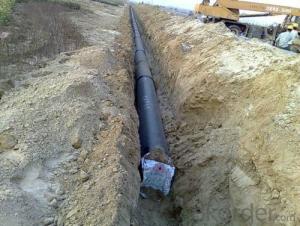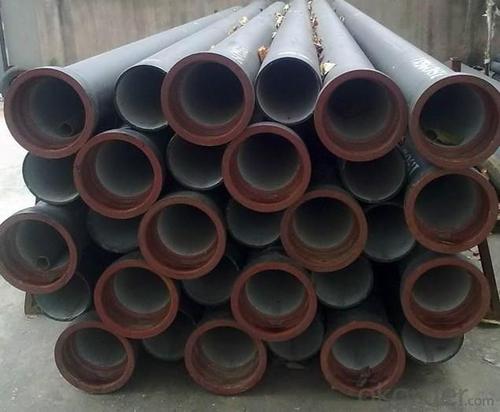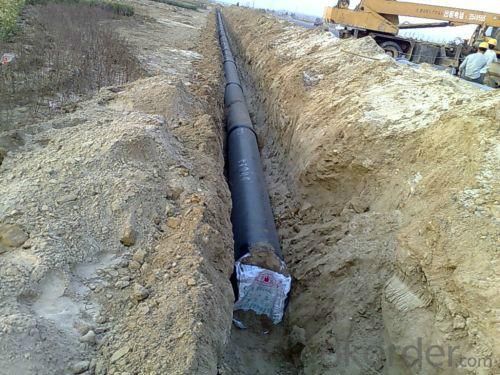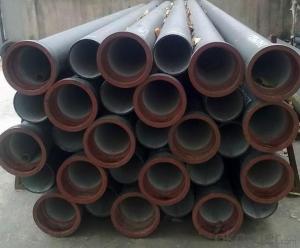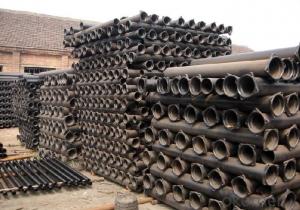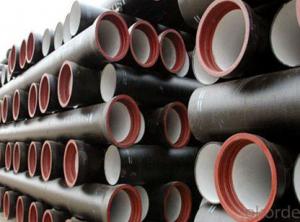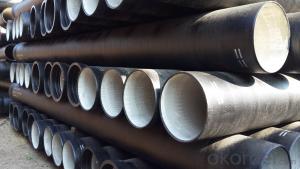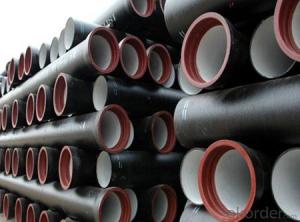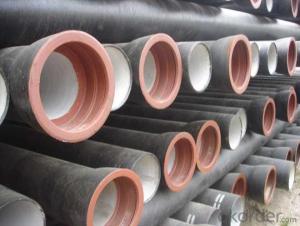Ductile Iron Pipe of China EN598 DN300-DN900
- Loading Port:
- China main port
- Payment Terms:
- TT or LC
- Min Order Qty:
- 22 m.t.
- Supply Capability:
- 50000 m.t./month
OKorder Service Pledge
OKorder Financial Service
You Might Also Like
1,Ductile Iron Pipe Description :
1) Pipes confirm to ISO2531,K9 class,T type joint,6m long,with inside cements lining conform to ISO4179, outside Zinc spraying(130g/m2) and bitumen coating(70μm) conform to ISO8179.
2) Pipe ends: Spigot and socket ends, with 100% SBR rubber gaskets accoding to ISO4633
3) we can do third party inspection according to customer's request.
4) Our products have been sold to many international market, such as Middle East and South East Asia and Africa.
2,Main Features of the Ductile Iron Pipe:
1).Quality guarantee
• Chemical checking
• NDE after rough machining
• Mechanical testing after heat treatment
• Final NDE,dimension inspected
2).Quality document
• Full Q.A document as per client request
3).Packing and Shipping
• standard export package(carton/wooden case/pallet)
• accept FOB,FAS,CNF,CIF door to door etc or customer designated shipping agent
4).Service
• Drawing: we can translate your original drawing, offer best suggestion on design
• Quality: we have full set quality control system to guarantee the best quality.
• Inspection: inspect in house, all our products must be checked 3 times before packing
3,Ductile Iron Pipe Images:
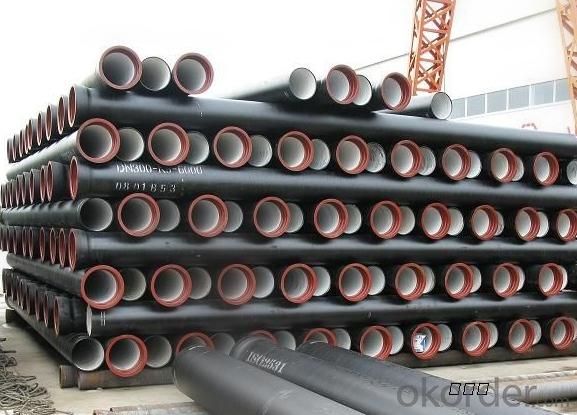
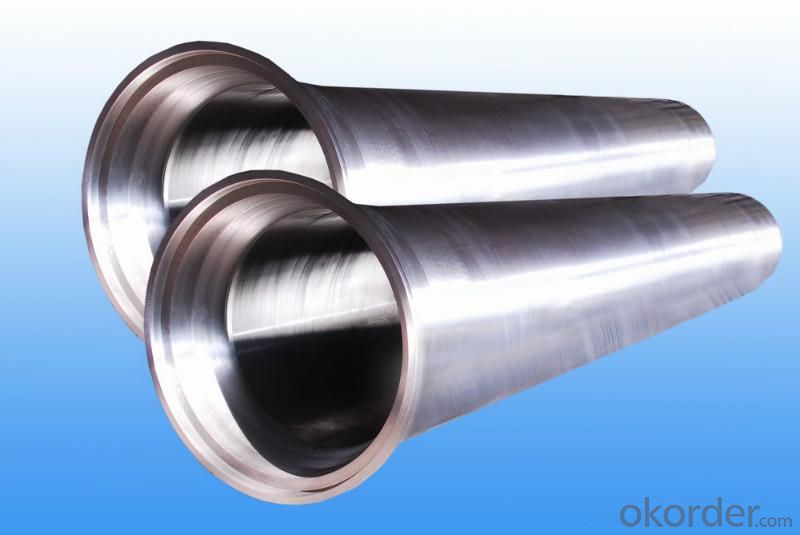
4. Ductile Iron Pipe Specification:
Surface Finishes: Bare, Oiled, Mill Varnish, Galv,FBE, FBE Dual, 3LPE, 3LPP, Coal Tar,Concrete Coating and Tape Wrap
End Finishes: Beveled, Square Cut, Threaded, hat
Additional Services: Internal Coating
Test: X-ray, UT, magnetic particle,inspection,hydrostatic test.
Processing service: Beveling, Threading, Slotting, Cut-to length, Bends, Quench and Temper, Fabrication, Double-jointing and On-site
Internal lining: ductile iron pipes shall have an internal cement mortar lining in acc with ISO4179.
External coating: ductile iron pipes shall be externally coated with metallic zinc spray plus a further layer of resin
Gasket: 100% SBR/NBR/EPDM rubber gasket in accordance with ISO4633.
Packing: ductile iron pipes from DN100 to DN300 be bundled with steel belts, others are in bulk.
Payment term: L/C, T/T.
5.FAQ:
We have organized several common questions for our clients,may help you sincerely:
1.Q: Why would you choose ductile iron pipe rather than other pipe materials?
A:The reasons are obvious for that not only ductile iron pipe possesses the inherent strength and flexibility of ductile
iron, combined with proven corrosion protection systems, but also the cost savings can be achieved from design to
installation and commissioning.
2.Q:Why can you guarantee the inner of pipes can’t be corroded?
A: High alumina cement mortar lining and sulphate-resistant cement mortar lining. These two special linings are applicable
to inner anti-corrosion for sewage pipes, improving resistance to erosion of the sewage components.
- Q: What is the internal lining used in ductile iron pipes?
- The internal lining used in ductile iron pipes is typically a cement mortar lining. This lining is applied to the inside surface of the pipe to protect it from corrosion and abrasion. The cement mortar lining helps to extend the lifespan of the pipes and ensures they can withstand the harsh conditions of transporting water or sewage. Additionally, the lining also improves the hydraulic efficiency of the pipes by reducing friction and preventing the formation of biofilms or deposits on the inner surface. Overall, the use of cement mortar lining in ductile iron pipes is essential for maintaining the integrity and functionality of the infrastructure.
- Q: How do ductile iron pipes handle water hammer in high-rise buildings?
- Known for their durability and strength, ductile iron pipes are an excellent option for managing water hammer in high-rise structures. Water hammer, a common occurrence when water flow abruptly halts or changes direction in pipes, causes pressure surges that can strain and potentially harm the pipes. Engineered to withstand high-pressure scenarios, ductile iron pipes exhibit remarkable resistance to water hammer. With their high tensile strength, these pipes can endure sudden pressure changes without warping or fracturing. This feature is especially crucial in high-rise constructions where water distribution must accommodate various floor pressures. Furthermore, the outstanding corrosion resistance of ductile iron pipes bolsters their ability to handle water hammer. Over time, corrosion weakens pipes, making them more prone to failure during pressure surges. However, the corrosion resistance of ductile iron pipes guarantees their structural integrity even in high-pressure circumstances. Moreover, the flexibility of ductile iron pipes enables them to absorb and dissipate the energy generated by water hammer. Consequently, the overall system experiences minimal impact, reducing the potential for damage. Absorbing energy also contributes to minimizing noise and vibrations associated with water hammer, thus enhancing the efficiency and comfort of the water supply system. To summarize, ductile iron pipes are well-suited to manage water hammer in high-rise buildings. Their strength, corrosion resistance, and flexibility make them a reliable choice for delivering water under varying pressures while upholding the system's integrity.
- Q: The difference between cast iron pipe and ductile iron pipe
- I don't understand your question! Both have spigot and socket connection type pipe material, also have flange,
- Q: Can ductile iron pipes be used for irrigation systems?
- Yes, ductile iron pipes can be used for irrigation systems. Ductile iron pipes are commonly used in various applications, including water supply systems and irrigation systems. They are known for their strength, durability, and corrosion resistance, making them suitable for transporting water in irrigation systems.
- Q: Can ductile iron pipes be used in areas with high soil settlement?
- Ductile iron pipes are suitable for areas with high soil settlement due to their strength and durability. They can withstand external loads and ground movement, making them an ideal choice for such areas. Additionally, these pipes have a high resistance to corrosion, making them even more suitable for use in areas with high soil settlement. However, it is important to consider factors such as proper installation techniques, appropriate bedding and backfill materials, and regular maintenance to ensure the longevity and performance of the ductile iron pipes in these areas. Consulting with a qualified engineer or pipe manufacturer can provide more specific guidance based on the site's conditions and requirements.
- Q: Can ductile iron pipes be used for water supply in buildings?
- Yes, ductile iron pipes can be used for water supply in buildings. Ductile iron pipes are known for their strength, durability, and corrosion resistance, making them suitable for a variety of applications, including water supply systems. They have a high tensile strength and can withstand high-pressure environments, making them ideal for delivering water to buildings. Additionally, ductile iron pipes have a long service life, reducing the need for frequent replacements. They also have good flow characteristics, allowing for efficient water distribution within the building. Therefore, ductile iron pipes are a reliable and commonly used choice for water supply systems in buildings.
- Q: Are ductile iron pipes suitable for trenchless pipe bursting methods?
- Indeed, ductile iron pipes prove to be an appropriate choice for trenchless pipe bursting techniques. Displaying exceptional strength and durability, ductile iron emerges as a material capable of enduring the formidable forces implicated in the pipe bursting procedure. Its remarkable tensile strength safeguards against the occurrence of cracks or fractures during the bursting process. Moreover, the inner surface of these pipes boasts a smooth texture, which facilitates the efficient flow of fluids such as water. The aforementioned smoothness further diminishes the odds of encountering blockages or accumulation within the pipe. All things considered, ductile iron pipes represent a dependable alternative for trenchless pipe bursting methods.
- Q: How can the cast iron pipe be connected?
- Cast iron pipes are flanged and socket connected
- Q: What are the different types of thrust restraints for ductile iron pipe?
- There are several different types of thrust restraints that can be used for ductile iron pipe installations. These thrust restraints are designed to prevent the pipe from moving or separating under the forces generated by internal pressure, external loads, or changes in temperature. 1. Thrust blocks: Thrust blocks are concrete structures that are typically installed at bends, tees, and other changes in direction in the pipeline. They are designed to resist the thrust forces by transferring them to the surrounding soil or foundation. 2. Mechanical restraints: Mechanical restraints, such as tie rods or harnesses, are used to restrain the pipe by exerting an external force on it. These restraints are typically made of steel and can be adjusted to accommodate changes in pipe length or alignment. 3. Pipe anchors: Pipe anchors are devices that are installed at specific intervals along the pipeline to provide resistance against axial movement. They are usually made of steel and are embedded into the surrounding soil or concrete to provide a secure anchor point for the pipe. 4. Thrust collars: Thrust collars are devices that are installed around the pipe to prevent it from moving or separating. They are typically made of steel and are placed at strategic locations along the pipeline to absorb the thrust forces. 5. Restrained joint systems: Restrained joint systems are specialized pipe joints that are designed to resist axial forces. These joints typically have additional features, such as keyways or wedges, that provide resistance against movement. It is important to select the appropriate type of thrust restraint based on the specific requirements of the ductile iron pipe installation. Factors such as the pipe diameter, operating pressure, soil conditions, and potential external loads should be considered when determining the most suitable thrust restraint system. Consulting with a qualified engineer or pipe manufacturer can help ensure the proper selection and installation of thrust restraints for ductile iron pipe.
- Q: How do ductile iron pipes perform in high-traffic areas?
- Ductile iron pipes perform exceptionally well in high-traffic areas due to their inherent strength and durability. These pipes are manufactured using a unique composition that includes graphite nodules, which give them their characteristic ductility. This ductility allows the pipes to flex and withstand heavy loads and vibrations caused by traffic without cracking or breaking. In high-traffic areas, where the ground is subject to constant movement and heavy loads from vehicles, ductile iron pipes offer superior resistance to stress and impact. Their ability to absorb and distribute the pressure from traffic ensures that these pipes maintain their structural integrity over time. This is particularly important as any damage or failure in a pipe system can result in costly repairs and disruptions to the water supply. Furthermore, ductile iron pipes are highly resistant to corrosion, making them suitable for installation in high-traffic areas exposed to various environmental conditions. The pipes are typically lined with a protective layer, such as cement mortar or epoxy, which provides an additional barrier against external factors. This corrosion resistance ensures the longevity of the pipes, reducing the need for frequent maintenance or replacement. Additionally, ductile iron pipes have excellent flow characteristics, allowing for efficient water distribution even in areas with high traffic demands. Their smooth interior surface minimizes friction and pressure losses, ensuring a consistent and reliable water supply to meet the needs of the surrounding population. Overall, ductile iron pipes are a reliable and robust choice for high-traffic areas. Their strength, durability, corrosion resistance, and efficient flow characteristics make them well-suited for withstanding the demands and challenges posed by heavy traffic, ensuring the continuous supply of water without compromising the structural integrity of the pipe system.
Send your message to us
Ductile Iron Pipe of China EN598 DN300-DN900
- Loading Port:
- China main port
- Payment Terms:
- TT or LC
- Min Order Qty:
- 22 m.t.
- Supply Capability:
- 50000 m.t./month
OKorder Service Pledge
OKorder Financial Service
Similar products
Hot products
Hot Searches
Related keywords

